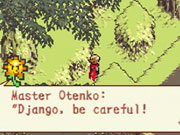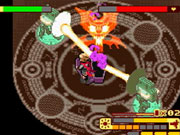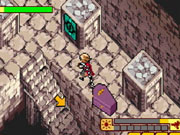The word "gimmick" tends to have a negative connotation. Many games have cheap tricks they use, like some specific feature listed in bold face on the back of the box that supposedly distinguishes it from the better, older games they're otherwise attempting to emulate. We refer to these little twists as "gimmicks," but the gimmicks themselves aren't what make these games mediocre--it's that the gimmicks don't make up for the games' underlying flaws. On the other hand, a game like Boktai: The Sun Is in Your Hand is gimmicky in a good way. Developed by Metal Gear Solid designer Hideo Kojima's studio, this is a very well-produced 16-bit-style action adventure game in the same vein as the classic The Legend of Zelda: A Link to the Past, but it's got a completely unique twist: It uses sunlight. Boktai would be a great game even if it didn't have a fancy solar sensor built right into the cartridge. That just serves to make it even more interesting.

The premise of Boktai is as unusual as the game's solar sensor. You play as Solar Boy Django, armed with the legendary gun del sol--a weapon that uses the power of sunlight to thwart evil. With the aid of Master Otenko, a little sunflower-like character brimming with valuable advice, Django must rid the world of a host of powerful undead creatures known as immortals. As you might expect, these monsters are virtually unstoppable and are vulnerable only to direct sunlight. Together, Django and Otenko must flush these bad guys out of their nocturnal, enemy-infested homes and purify them with concentrated sun rays. Django doesn't have an easy time of this as the immortals are powerful, and their lairs are filled with enemies, traps, some tricky puzzles, and other dangers. Nonetheless, the game keeps a mostly brisk pacing, and the story is quite good and suitable for all audiences. Though this is a fantasy game with an anime influence, the occasional older player may be pleasantly surprised by a number of obscure references to cult classic Westerns. For example, Django and his rival, Sabata, are apparently named after a couple of spaghetti Western gunslingers.
At its core, Boktai is an isometric action game, featuring a good mix of combat, exploration, and puzzle solving. Gameplay involves avoiding or taking out various enemies using the customizable gun del sol, which you can upgrade or modify using various parts you find during the course of the game. As if the Western references aren't weird enough, Boktai features a couple of obvious references to the Metal Gear Solid games in it as well. Django can press his back to a wall and knock on it, creating a diversion that causes nearby enemies to come and investigate. A certain type of creature is blind but has such acute hearing that only by sidling against a wall can Django go by undetected. Thankfully, the stealth elements are actually (and mostly) optional. You're rewarded for slipping through the game's various dungeons as stealthily as possible, but there's little need to be deliberate if you don't have the patience for it. Either way, using the right shoulder button scrolls the screen, to some extent, allowing Django to get a look at what's in store for him. You can conveniently access an area map, and you usually have plenty of items on hand (multicolored, multipurpose "solar fruits") for restoring your health and temporarily boosting your abilities.
For the most part, you need sunlight to resupply the gun del sol with its ammunition. No, you can't just shine a flashlight or a desk lamp onto the Boktai cartridge to trick it, though you don't strictly need to play the game outside, as sunlight pouring through a window is perfectly fine. This is even preferable in some cases because if you play under a hot sun for too long, the gun del sol actually overheats, encouraging you to seek a shady spot before continuing. Generally, the more direct sunlight you're getting, the faster Django recharges his weapon. Even a little sunlight goes a long way, though.

Sunlight has other, more interesting effects on the game. Boktai features a real-time sun sensor that gives you a good idea of how much, if any, sun you're getting. Hide your Game Boy Advance in the shade, and the meter instantly drops to zero. When playing in the sun, you'll see the in-game environments change slightly. For instance, you might see sunlight seeping through a barred window pane in one of the immortals' mansions. Stand in the sunny spot, and that's where you can recharge indoors. Boktai also features a real-time clock, and the game has a day/night cycle and even informs you when you're playing under a full moon or other such cosmic event. These are surprising and cool touches, but they're mostly just for show. On the other hand, there are a number of very clever puzzles and encounters in the game that specifically make use of the sunlight sensor and/or the real-time clock. These are truly innovative and inspired moments, made possible by the portable nature of the Game Boy Advance. Without spoiling anything, there are times when being in the sun doesn't actually work to your advantage.
When you first start playing Boktai, it should be during the daytime. The gun del sol's default battery doesn't store much juice. Later on, though, you'll find bigger batteries as well as a supply of solar nuts--items that refill a bit of the gun's energy reserves. You can store solar energy in special stations found in the game's indoor environments, and you can even get your hands on some grenades that work like solar flares, temporarily creating artificial sunlight in the game. So, basically, the farther into Boktai you get, the longer you can play the game for stretches at a time--whether it's at night or when it isn't sunny. It's more or less required that you battle the immortals (the game's main bosses) in sunlight, but if you're concerned that playing Boktai will be inconvenient during the cloudy days of autumn, you shouldn't be. Not really.

Skeptics might assume that the game's focus on sunlight is just to compensate for what's probably considered a short game length, but they'll be pleased to know that Boktai is a solid 10 hours long the first time through,--and that's if you skip past, literally, a dozen or so optional dungeons. These dungeons could easily add another five hours of gameplay. The game has a good amount of replay value even after you finish the main quest, as you can then restart with all your equipment intact and attempt to go through the game looking for hidden secrets and collecting as high a rating as possible for each area. There's also a link mode for exchanging items--as well as for battling it out--with up to three other players.
Though the game's got some fun dungeon crawls and some inventive puzzles, the battles against the immortals are truly the highlight of Boktai and involve one of the game's other unique touches. Not only do you have to defeat these hardy villains once, but afterwards, you still need to purify them. Basically, once you destroy one of these bad guys' corporeal forms, it gets sealed in a coffin. Django must then drag the coffin outside so that he and Otenko can perform the purification ritual. This simply involves the coffin's resident getting zapped by concentrated beams of sunlight until he or she is totally and finally destroyed.
This is really good stuff. For one thing, the process of dragging the coffin across the level you initially had to fight your way through is an entertaining change of pace. You can't shoot while dragging a coffin, though, fortunately, pulling one along doesn't slow you down too much. You can also use the coffin to manipulate pressure-sensitive floor panels, giving you access to areas you couldn't previously reach. Be careful, though, because the will of the immortal is such that occasionally the coffin will break free of your control and start skittering back to the heart of the dungeon. A nice sunbath, courtesy of the gun del sol, is just the ticket to calming it down. Then, once you finally begin the purification ritual, another boss battle begins as the immortal starts desperately trying to repel the sun rays blasted into him or her. Django needs to manually fuel the beams that are burning the immortal while avoiding the creature's last-ditch attacks. These battles end up being quite dramatic.
Boktai runs the gamut of 16-bit action adventure environments. You venture through a creepy forest, a graveyard, an ice cave, a fire cave, a number of spooky mansions, and more. These areas routinely look great, and the artwork and the animation for the characters are simply superb; it's as good as--or even superior to--the best 2D artwork from the 16-bit era. The game features a lighthearted and distinctive visual style that effectively sets it apart from other top-down action adventure games. Boktai's audio is also really impressive. Though the sound effects and some of the music aren't that special, the game features an ample use of crisp and even well-acted digitized speech. The music during boss battles is also very intense and really adds a lot to these encounters.

For the most part, Boktai isn't a hard game--even at the default difficulty setting. Should Django run out of health, you can just restart with full health in the same room, so the game never gets frustrating--except for maybe the occasional mind-bending puzzle (the game eventually clues you in if you get really stuck) or an untimely real-life sunset or cloudy day. Nonetheless, though this solar-powered game might seem gimmicky (perhaps in a bad way at first glance), you can rest assured that the game uses its much-vaunted technical feature in unique and surprising ways. Most importantly, at its core, this is a first-rate action adventure game that features a good story, challenging puzzles, memorable battles, and some of the finest graphics and sound, to date, on the Game Boy Advance.